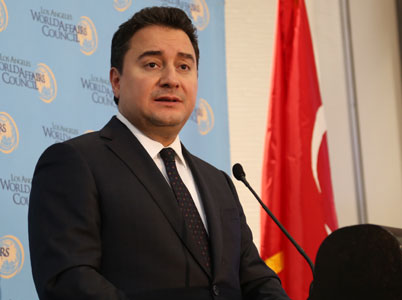
Turkish Deputy Prime Minister Ali Babacan spoke to the Los Angeles World Affairs Council on Monday night about Turkey’s extraordinary economic development in the past 11 years - and also confronted some of the more controversial aspects of the country’s past. A Fulbright scholar who earned his MBA at Northwestern and worked for a bank consulting company in Chicago before returning to Turkey, Mr. Babacan is one of the technocrats who is most closely associated with overseeing Turkey’s economic take-off. Turkey is now the 17th biggest economy in the world.
Beginning with the sudden coming to power of the AKP (Justice and Development Party) of Prime Minister Erdogan in 2002, Turkey’s economy has tripled in size in 11 years, and it has gone from being an aid recipient with a 30% poverty rate to an aid donor with a 2.7% poverty rate. “It has been an incredible time for reforms since 2002,” he said, pointing to improvements not just in the economy, but also in the advance of democracy and human rights.
Once dominated by its military, Turkey now has a functional mix of “Islam, democracy and secularism” he said. As such, it has been a model for the region, particularly in the spread of the Arab Spring, during which many Arab countries have looked to Turkey as a model. Turkey, said Mr Babacan, has a “360 degree foreign policy” - while maintaining its links with the West, it has strengthened ties with Russia, China, India and Africa as well as its neighbors in the Middle East.
He conceded that all was not perfect in Turkey - he said “the police probably overreacted initially” in their response to the demonstrations in May and June of this year in Istanbul’s Taksim Gezi park over a planned redevelopment project that mushroomed into protests against the government.
When questioned about the mass killings of Armenians in 1915, widely referred to by Armenians as a case of “genocide”, Mr. Babacan said this was a very serious matter, and needed to be historically investigated using archives from Turkey and from Armenia to reach a consensus.
Mr. Babacan said his government was particularly concerned today with the situation in Syria, which shares a long border with Turkey. Already more than 100,000 people have died in the full-blown civil war since 2011. But this death toll appears to have been relegated in importance by many of the international players to focus purely on chemical weapons, which, he said “have killed at most a couple of thousand... So it is ok to be killed by Scud missiles or air strikes or artillery – but not by chemical weapons?" For Turkey, he said, this is missing the main humanitarian concern. “Right now, we feel quite lonely on the Syrian issue.”
But overall Mr. Babacan had an optimistic and bullish view of the future for Turkey. By 2023 he said Turkey hoped to increase GDP another 2.5 times, and increase exports by three and a half times, to $500 billion. And with no financial center between Frankfurt and Dubai, Mr. Babacan sees Istanbul becoming one of the top 10 financial centers in the world in the next 10 years. Pointing out that Turkey now has a per capita GDP that has risen to approximately half that of Japan, he says “that isn’t bad –for a country that was an aid recipient just 10 years ago.”
